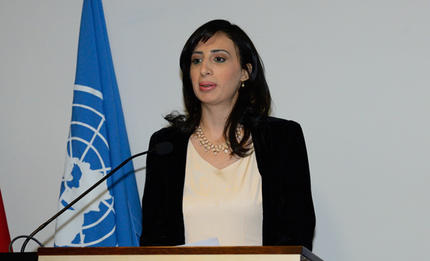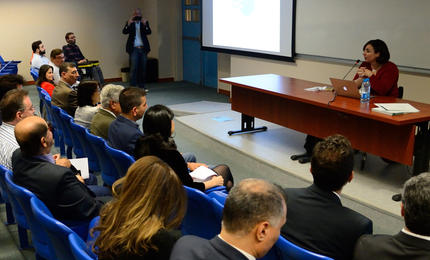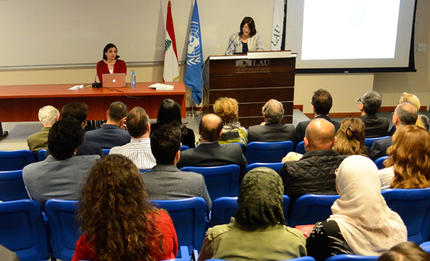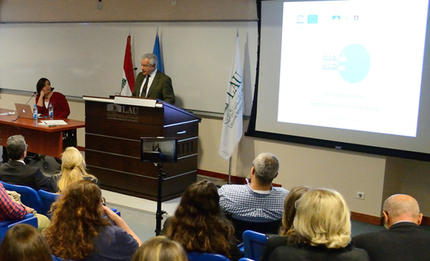CLS at LAU launches campaign for inclusive design
Campaign for social and economic inclusion by the Centre for Lebanese Studies seeks to galvanize public into action.

Specialist in inclusive design and younger sister of the CLS director, Itab Shuayb, believes that inclusive design should be a required course for design students.

CLS Director Maha Shuayb has first-hand experience of the impact of design on the mobility of citizens.
When all else fails, nothing works better than humor to drive home the absurdity of a situation. So it was with humorous videos that the Centre for Lebanese Studies (CLS) kicked off its Inclusive Design campaign at LAU Beirut campus to highlight the lack of inclusion, and respect, for a large section of the population, and to galvanize the public into action.
“This campaign is the result of a personal experience,” said CLS Director Maha Shuayb, an education specialist who at the age of 13 became a wheelchair user after an accident. “People’s perception of me and my ambitions changed once I was confined to a wheelchair, and my access to education was hindered.”
While Shuayb persevered and went on to earn a Ph.D. at the University of Cambridge, she is acutely aware of the impact of design on the mobility of citizens and their ability to fully engage in their country’s development. “I left for the U.K. where I had more choices, and when I returned a decade later I found nothing had changed in Lebanon,” she explained to the dozens gathered to support and celebrate the innovative videos produced by the Institute for Media Research and Training at LAU.
The series of humorous videos draw attention to the plight of people with limited mobility — such as wheelchair users, mothers with pushchairs, or the elderly and injured with walking sticks and crutches — be it through lack of facilities or a general disregard for signs.
Adhering by the theme of the campaign “Something Simple” — “Shagle Sahle”— the videos not only demonstrate the ease with which straightforward design changes can be made to achieve inclusion, but also call for respecting the needs of fellow citizens. While one featured physically able individuals parking in a bay reserved for the disabled, another advocated baby-changing stations in men’s restrooms.
“Inclusive design is about designing spaces and facilities that respect all sectors of a city,” explained Itab Shuayb, a specialist in inclusive design and younger sister of the CLS director, during the launch ceremony. “It enhances society and the economy… and should be a core course for all design students, not an elective,” added the younger Shuayb, who teaches at AUB.
LAU President Joseph G. Jabbra was also present to show his support for the campaign and the work of CLS. “This university goes beyond academics to truly embrace the development of society and the creation of a nation,” he said, asserting the need for inclusive design in the development of an inclusive civically engaged society.
Program specialist for social and human sciences at UNESCO Seiko Sugita echoed the sentiment. “To enable people to use knowledge, social inclusion is key and a priority at UNESCO,” she said, explaining the value of their work and partnership with CLS and “talented youth, especially at LAU.”
Also present was Nawaf Kabara, director of the National Association for the Rights of Disabled People and professor of political science at Balamand. “This campaign is important and we need more of them,” said Kabara, adding that change takes time.
“It took us 15 years to get law number 220 in, and now over 15 years later, no more than 25 percent of that law is enforced,” added the professor, referring to a law enacted in 2000 that secures basic rights for the disabled. “I am, however, very happy to see this wave of activism. Social media campaigns can influence cultural norms and help toward strengthening the voice of the disabled and influencing policy.”
View all the videos associated with this campaign on the CLS YouTube channel.
More
Latest Stories
- LAU Engages High Schoolers With Creative Expression and Scholarship Awards
- How Does Digital Media Impact Our Brain?
- Community Development Takes Root at Capstone Presentation Day
- LAU Athletes Return Victorious from Athens and Belgrade
- A New Initiative Toward Harnessing Digital Transformation
- A Cardiovascular Conference to Streamline National Expertise
- Aspiring Engineers Compete for Scholarships at LAU
- The School of Engineering Delivers Immersive Learning Experiences



